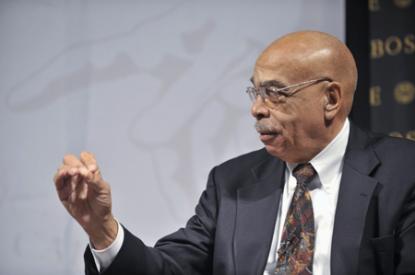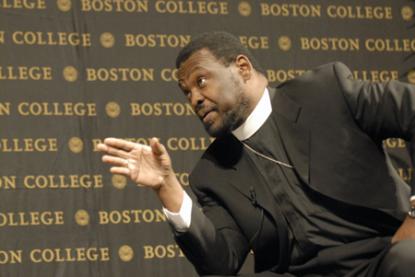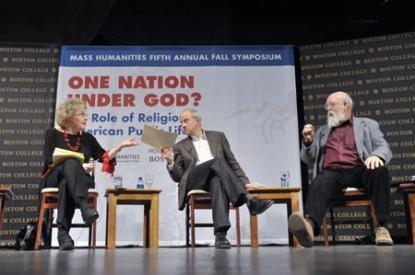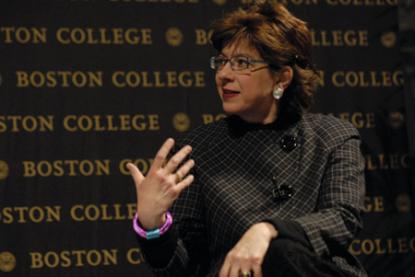Your parents may have told you to avoid talking about religion and politics in public, but almost 300 people did just that on November 22, 2008, when they participated in the fifth annual Mass Humanities symposium, “One Nation under God? The Role of Religion in American Public Life,” hosted by Boston College. The program brought a stellar group of academics, journalists, theologians and other thought leaders together with students and members of the general public for an intensive discussion of religion in the contemporary public square.
While we take pride in America’s ideal of separating church and state, religion has always played an important role in our politics and culture. In the mid-1800s, Alexis deTocqueville, the French observer of the emerging nation, wrote of America: “This civilization is the result . . . of two quite distinct ingredients, which anywhere else have often ended in war but which Americans have succeeded somehow to meld together in wondrous harmony; namely the spirit of religion and the spirit of liberty.” But, like all ideas and institutions, religion evolves, and the shifting cultural values of the early 21st century reflect the realignment of this “wondrous harmony.”
Participants in the first session– “How Religion Shapes American Culture” –noted that, while the separation of church and state is an ideal of post-Enlightenment societies, religion and culture in fact cannot be separated. Indeed, panelist Margaret Steinfels suggested that the framing question should not only be, “How does religion influence American culture?” but also “How does American society influence religion?” For example, look at how the women’s rights movement has led to the ordination of women priests in certain denominations.
Speaking about contemporary America, moderator Alan Wolfe of Boston College noted “the religion gap has been transformed” in this country, adding that this becomes “problematic when politics overlaps exactly with a particular religion.” Columbia’s Mark Lilla observed that religion and culture have always been intertwined: “Religion is part of American culture. It’s not religion and . . .”The two cannot be separated. Princeton Theological Seminary’s Peter Paris stressed that, while we have always had religious and cultural diversity in the United States, some people still are kept on the outside of both religion and culture, and we must deal with the long-term implications of such disenfranchisement. He also made the important point that what is commonly referred to as “the Black church” is not some monolithic institution–it is in fact as theologically, socially, and politically diverse as any other part of America’s religious landscape.
Paris stressed that, while we have always had religious and cultural diversity in the United States, some people still are kept on the outside of both religion and culture, and we must deal with the long-term implications of such disenfranchisement. He also made the important point that what is commonly referred to as “the Black church” is not some monolithic institution–it is in fact as theologically, socially, and politically diverse as any other part of America’s religious landscape.
Panelists and audience members alike recognized that the recent presidential election adds a new dynamic force to public conversations about religion and culture. The second panel looked at the influences of religion in electoral politics. Much of the discussion focused on recent changes in the Evangelical movement and its impact on national politics, as reflected in the Obama and McCain campaigns. This included a turning toward the Democratic Party and away from traditional alignment with the Republicans. Attention was also paid to the role of  Black churches in the election, both in terms of their support for Barack Obama and their alleged role in passing California’s Proposition 8, outlawing same sex marriages and leading to growing tensions between the GLBT community and more conservative churches that have supported other civil rights initiatives. Bishop Henry Jackson, Senior Pastor of Hope Christian Church in Washington, D.C., spoke of the conservative nature of many Black congregations, underscoring an important cultural gap:“white Americans don't understand the Black church.” Time correspondent Amy Sullivan observed that younger Evangelicals concerned with social issues appear more open to partnerships with government than the older generation, and Steve Waldman, editor-in-chief of Beliefnet.com commented that the secular left “bit its tongue” when candidate Obama criticized the Democrats for putting down religion.
Black churches in the election, both in terms of their support for Barack Obama and their alleged role in passing California’s Proposition 8, outlawing same sex marriages and leading to growing tensions between the GLBT community and more conservative churches that have supported other civil rights initiatives. Bishop Henry Jackson, Senior Pastor of Hope Christian Church in Washington, D.C., spoke of the conservative nature of many Black congregations, underscoring an important cultural gap:“white Americans don't understand the Black church.” Time correspondent Amy Sullivan observed that younger Evangelicals concerned with social issues appear more open to partnerships with government than the older generation, and Steve Waldman, editor-in-chief of Beliefnet.com commented that the secular left “bit its tongue” when candidate Obama criticized the Democrats for putting down religion.
The final session, “Religion, Morality and the Law,” dealt with personal behavior as influenced by both religious and secular thought. Tufts professor Daniel Dennett, introduced by Mass Humanities Board member Ben Birnbaum as “one of the Four Horsemen of Atheism,” defended the secular liberal point of view, calling American society “hyper-respectful” of religion and not holding faith communities to the same standard of rational discourse as it does other elements of society. Moderator Michael Sandel of Harvard raised the question of whether the law should make special exemptions for minority religious practices and how much accommodation was appropriate.
A particularly lively discussion centered around any President’s ability to keep his personal religious beliefs private and work in a secular national interest. With Daniel Dennett holding the view that reasoned moral argument must be a secular process, Jean Bethke Elshtain of the University of Chicago argued that the alternative is not between “privacy” and “belief,” because any leader is formed and shaped by his religious tradition. Stephen Carter of Yale Law School said he was “troubled by the question because the question is impossible,” however, the President must be conscious of the influences that shape his policies.
religious beliefs private and work in a secular national interest. With Daniel Dennett holding the view that reasoned moral argument must be a secular process, Jean Bethke Elshtain of the University of Chicago argued that the alternative is not between “privacy” and “belief,” because any leader is formed and shaped by his religious tradition. Stephen Carter of Yale Law School said he was “troubled by the question because the question is impossible,” however, the President must be conscious of the influences that shape his policies.
All the discussions were stimulating, but it was also interesting to note some of the issues that were not raised. For example,  Susannah Heschel of Dartmouth College articulately discussed the special needs of minorities like Orthodox Jews, whose lives are tied to religious law, but nowhere in the program was there recognition of the position of the overwhelming majority of American Jews, who either identify as “secular” or belong to non-Orthodox denominations. Similarly, while there was clear consciousness and concern about including Americans of Muslim faith in the public square, Eastern religions and other moral/ethical traditions were largely ignored, although the diversity and differences of thought and practice in countries like India and China will have increasing impact on our society as globalization increases.
Susannah Heschel of Dartmouth College articulately discussed the special needs of minorities like Orthodox Jews, whose lives are tied to religious law, but nowhere in the program was there recognition of the position of the overwhelming majority of American Jews, who either identify as “secular” or belong to non-Orthodox denominations. Similarly, while there was clear consciousness and concern about including Americans of Muslim faith in the public square, Eastern religions and other moral/ethical traditions were largely ignored, although the diversity and differences of thought and practice in countries like India and China will have increasing impact on our society as globalization increases.
But, after all, we only had four hours to consider topics that people have been debating for centuries. And the conversation will continue, at Mass Humanities, Boston College and elsewhere. For, as Newsweek editor Jon Meacham observed, “Nothing is ever settled in this country,” to which I would add, “Thank God . . . or To Whom It May Concern.”
PHOTOS by Frank Curran

